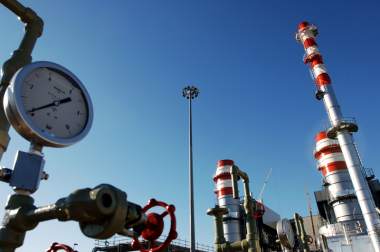Nuclear the 'only solution' to Italy's energy imports
09 January 2009
The continuing squeeze on gas supplies in Europe has led a utility president to declare "The only long run solution for Italy is nuclear energy."
 |
The Torviscosa gas-fired power plant.
Italy does not have any operating
nuclear power plants for WNN to feature |
Giuliano Zuccoli, president of Edison, made the statement in an interview with
Corriere della Sera yesterday. "Italy has the most advanced and efficient energy system of the world, based on combined cycle power plants. The only problem is that these plants need gas to work." Supplies of gas to European markets have dropped by 30% because of the spat between Gazprom and its Ukrainian customers that began on 1 January.
Edison has 17% of Italy's power generation capacity, making it the second largest supplier, while Zuccoli is also the chair of the supervisory board of another power utility, A2A, which was founded in January 2008 after the merger of AEM Milan and ASM of Brescia.
Relying as it does on energy imports, Italy is well prepared for disruptions to its gas supply. The Italian government claims to have some of the largest reserves in Europe, which amount to 14 billion cubic metres and are said to be adequate to last for two months. However, there is not yet a clear long term strategy or goal for energy policy: "Although we can be calm in the short run, I think we should face the problem firmly, thinking in the medium and long run. That's why I'm strongly supporting nuclear energy," Zuccoli said.
Edison, controlled by A2A, is one of the founders of Energy Lab, a think tank it created in September 2007 with AEM, the Lombardia region, the University of Milan, the University of Milan - Bicocca, the Catholic University, Milan Polytecnic and Bocconi University.
In October 2008 Energy Lab produced a Preliminary Report on the Conditions for the Return of Nuclear Energy in Italy. In this paper, Energy Lab gave several recommendations such as ensuring government decisions on new nuclear projects can be made quickly. "Bureaucracy, this is the real problem. We can't know how long it will take to get all the authorizations. Edison is ready and we gave our indications through the latest report," Zuccoli said.
Claudio Scajola, Italy's minister of economic development has declared that energy diversification is no longer avoidable and nuclear energy is the first option. In the medium term, a statement from Scajola said, "we are working on new agreements with other [gas] supplier countries" and "in any case we cannot but think about the future and diversify our sources with the return to nuclear power." He concluded that "The shortsightedness of the past continues to put us at risk." Italy once had a thriving nuclear power sector, but a referendum called after the Chernobyl disaster in led to the country's five reactors being shut down by 1990.
In recent days Slovakian and Bulgarian leaders have mooted the possibility of restarting nuclear reactors shut down as part of EU accession agreements. Another European country forced to connect the current gas crisis to its past nuclear power policies is Germany. A coalition government helped to power by a minority Green contingent put in place legislation to force all nuclear power plants to close early. The country has since worked hard to build sufficient wind and solar power to replace the reactors that still provide about one third of electricity, but as the dates for nuclear shutdown approach it seems increasingly likely that coal will be the fuel of choice to replace nuclear power. German voters will go to the polls in September, with the future use of nuclear power in terms of energy security and climate protection as a major issue.